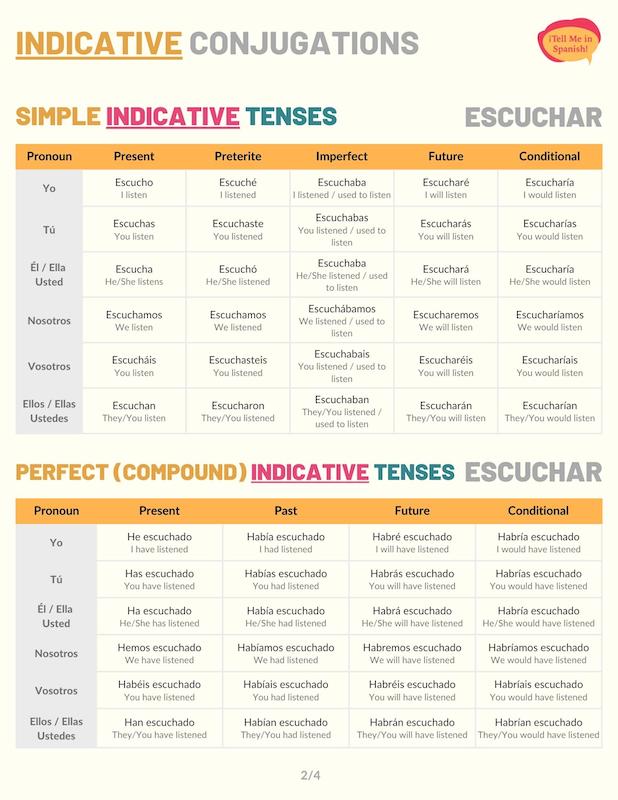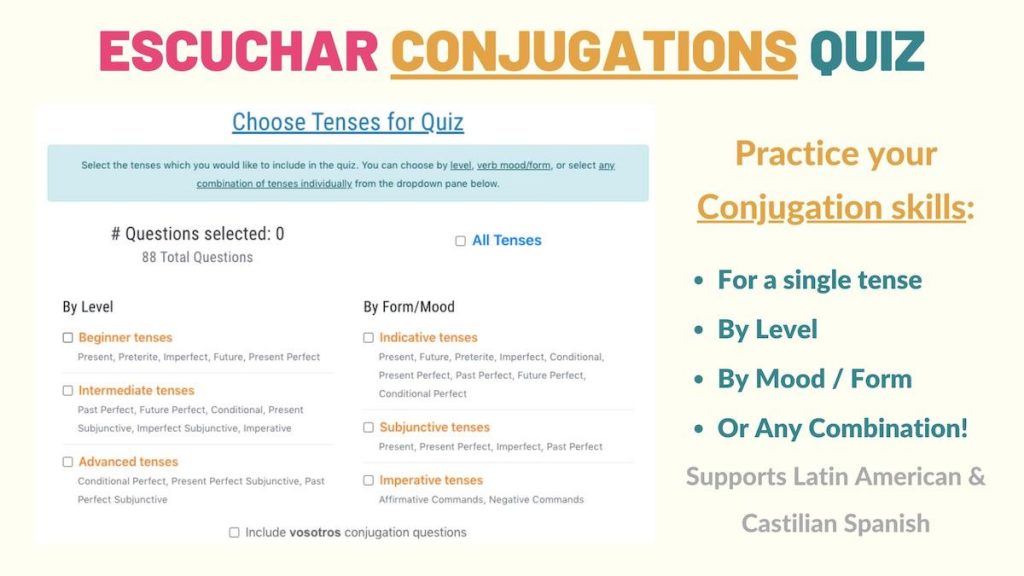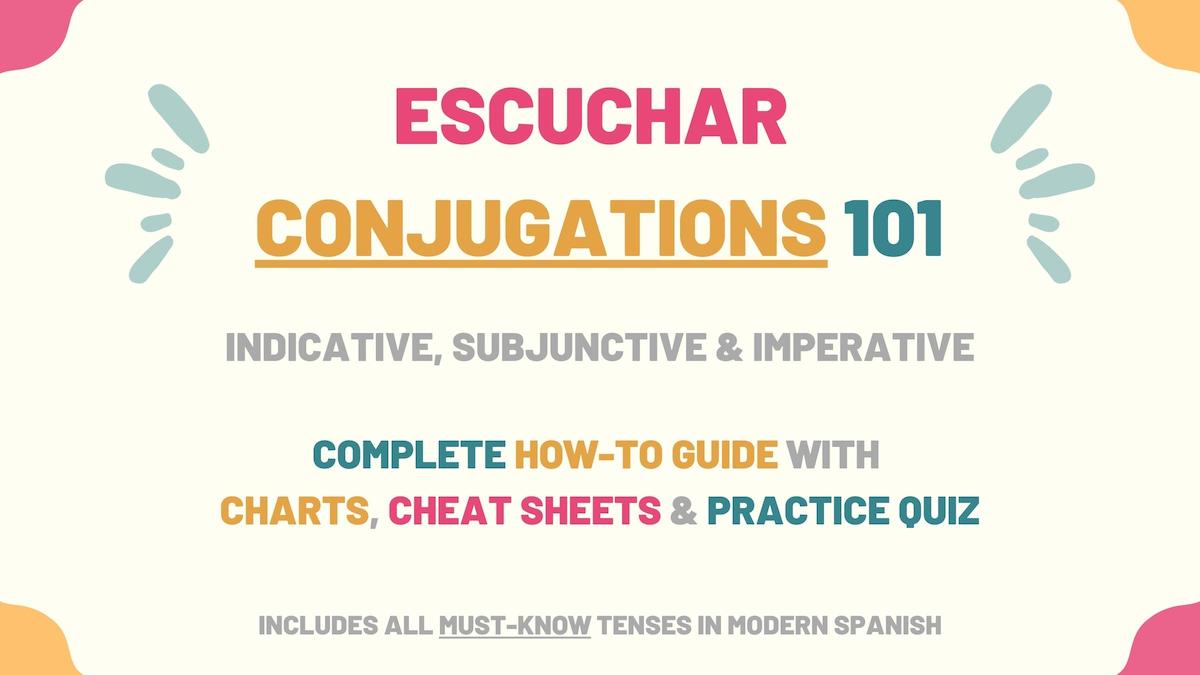If you’re learning to conjugate verbs in Spanish, escuchar is great for practicing the -AR verbs model. Since it’s also frequently used in conversations, in this guide, we’ll learn the escuchar conjugation patterns.
- Escuchar Overview
- Indicative Tenses of Escuchar Conjugations
- Subjunctive Tenses of Escuchar Conjugations
- Imperative (Commands) of Escuchar Conjugations
- Uses & Examples
- Download Escuchar Conjugation Tables & Uses Cheat sheets
- Escuchar Conjugation Practice Quiz
Overview of Escuchar
| Verb Characteristic | Property |
|---|---|
| Verb Type | -AR |
| Irregular | No |
| Infinitive | Escuchar |
| Gerund (Present Participle) Form | Escuchando |
| Past Participle Form | Escuchado |
| Synonyms | Oír. |
Indicative Conjugations of Escuchar
Present tense
The following escuchar conjugation chart shows you the endings you must use to conjugate this verb to the present tense in Spanish. In this tense, this verb is used to say that people listen to something or someone. Yo casi no escucho música.
| Person | Conjugation | Translation |
|---|---|---|
| Yo | Escucho | I listen |
| Tú | Escuchas | You listen |
| Él / Ella Usted | Escucha | He/She listens You (formal) listen |
| Nosotros | Escuchamos | We listen |
| Vosotros | Escucháis | You listen |
| Ellos / Ellas Ustedes | Escuchan | They listen You (plural) listen |
Preterite tense
In Spanish, we conjugate this verb to the preterite tense to express that someone heard or listened to something at some time in the past. For example: ¿Escuchaste eso? You can see how to conjugate escuchar in the preterite conjugation chart below.
| Person | Conjugation | Translation |
|---|---|---|
| Yo | Escuché | I listened |
| Tú | Escuchaste | You listened |
| Él / Ella Usted | Escuchó | He/She listened You (formal) listened |
| Nosotros | Escuchamos | We listened |
| Vosotros | Escuchasteis | You listened |
| Ellos / Ellas Ustedes | Escucharon | They listened You (plural) listened |
Imperfect tense
These escuchar conjugations are also regular. When conjugated to the imperfect tense, this verb allows you to talk about the things people heard or listened to repeatedly in the past. For example: Susana nunca escuchaba a sus papás.
| Person | Conjugation | Translation |
|---|---|---|
| Yo | Escuchaba | I listened I used to listen |
| Tú | Escuchabas | You listened You used to listen |
| Él / Ella Usted | Escuchaba | He/She listened He/She used to listen You (formal) listened You (formal) used to listen |
| Nosotros | Escuchábamos | We listened We used to listen |
| Vosotros | Escuchabais | You listened You used to listen |
| Ellos / Ellas Ustedes | Escuchaban | They listened They used to listen You (plural) listened You (plural) used to listen |
Near future
As displayed in the escuchar conjugation chart below, the near future in Spanish is built with ir present forms + verb in the infinitive form. This tense conveys that someone is about or will listen to something soon. For example: Voy a escuchar el mensaje que me mandaste.
| Person | Conjugation | Translation |
|---|---|---|
| Yo | Voy a escuchar | I’m going to listen |
| Tú | Vas a escuchar | You’re going to listen |
| Él / Ella Usted | Va a escuchar | He/She is going to listen You (formal) are going to listen |
| Nosotros | Vamos a escuchar | We’re going to listen |
| Vosotros | Vais a escuchar | You’re going to listen |
| Ellos / Ellas Ustedes | Van a escuchar | They’re going to listen You (plural) are going to listen |
Future simple tense
In the future simple, escuchar conveys that someone will hear or listen to something in the future. For instance: En unas horas, escucharemos al director.
| Person | Conjugation | Translation |
|---|---|---|
| Yo | Escucharé | I will listen |
| Tú | Escucharás | You will listen |
| Él / Ella Usted | Escuchará | He/She will listen You (formal) will listen |
| Nosotros | Escucharemos | We will listen |
| Vosotros | Escucharéis | You (formal) will listen |
| Ellos / Ellas Ustedes | Escucharán | They will listen You (plural) will listen |
Conditional tense
Conjugate this verb to the conditional tense in Spanish if you want to say that someone would hear or listen. Si fueras más amable, escucharía lo que tienes que decirme.
| Person | Conjugation | Translation |
|---|---|---|
| Yo | Escucharía | I would listen |
| Tú | Escucharías | You would listen |
| Él / Ella Usted | Escucharía | He/She would listen You (formal) would listen |
| Nosotros | Escucharíamos | We would listen |
| Vosotros | Escucharíais | You would listen |
| Ellos / Ellas Ustedes | Escucharían | They would listen You (plural) would listen |
Present perfect tense
The Spanish present perfect tense is used to say that someone has or hasn’t listened to something. To create sentences with this tense, you must use haber present conjugations + escuchado. Here is an example: ¿Has escuchado esta canción?
| Person | Conjugation | Translation |
|---|---|---|
| Yo | He escuchado | I have listened |
| Tú | Has escuchado | You have listened |
| Él / Ella Usted | Ha escuchado | He/She has listened You (formal) have listened |
| Nosotros | Hemos escuchado | We have listened |
| Vosotros | Habéis escuchado | You have listened |
| Ellos / Ellas Ustedes | Han escuchado | They have listened You (plural) have listened |
Past perfect
Use escuchar conjugated to the past perfect indicative to explain that a person had heard or listened to something before a past reference point. For example: Pensé que ya habían escuchado el mensaje que les dejé.
Use escuchar’s past participle form and the haber imperfect conjugations to conjugate to this past tense.
| Person | Conjugation | Translation |
|---|---|---|
| Yo | Había escuchado | I had listened |
| Tú | Habías escuchado | You had listened |
| Él / Ella Usted | Había escuchado | He/She had listened You (formal) had listened |
| Nosotros | Habíamos escuchado | We had listened |
| Vosotros | Habíais escuchado | You had listened |
| Ellos / Ellas Ustedes | Habían escuchado | They had listened You (plural) had listened |
Future perfect
The future perfect tense of this verb allows you to communicate that a person will have heard or listened to something by or before a future action. For example: ¿Por qué no habrán escuchado mi mensaje?
| Person | Conjugation | Translation |
|---|---|---|
| Yo | Habré escuchado | I will have listened |
| Tú | Habrás escuchado | You will have listened |
| Él / Ella Usted | Habrá escuchado | He/She will have listened You (formal) will have listened |
| Nosotros | Habremos escuchado | We will have listened |
| Vosotros | Habréis escuchado | You will have listened |
| Ellos / Ellas Ustedes | Habrán escuchado | They will have listened You (plural) will have listened |
Conditional perfect
In Spanish, the conditional tense of ‘escuchar’ expresses that a person would have heard or listened to something if a condition had been fulfilled. Si no fuera por ti, nunca habría escuchado esta canción.
| Person | Conjugation | Translation |
|---|---|---|
| Yo | Habría escuchado | I would have listened |
| Tú | Habrías escuchado | You would have listened |
| Él / Ella Usted | Habría escuchado | He/She would have listened You (formal) would have listened |
| Nosotros | Habríamos escuchado | We would have listened |
| Vosotros | Habríais escuchado | You would have listened |
| Ellos / Ellas Ustedes | Habrían escuchado | They would have listened You (plural) would have listened |
Progressive tenses
With the progressive tenses, you can convey that a person is listening to something at the moment of speaking. The past forms (preterite or imperfect) communicate that an action occurred when someone was listening to something. For example: Luke está escuchando música.
To form these tenses, use estar conjugated + escuchando (verb in gerund).
| Progressive Tense | Formula | Translation Example |
|---|---|---|
| Present | Estar (present) + escuchando | I am listening |
| Preterite | Estar (preterite) + escuchando | You were listening |
| Imperfect | Estar (imperfect) + escuchando | He was listening |
| Future | Estar (future) + escuchando | We will be listening |
| Conditional | Estar (conditional) + escuchando | They would be listening |
Escuchar Subjunctive Conjugations
The Spanish subjunctive mood allows you to refer to your or someone’s hopes, expectations, wishes, doubts, recommendations, hypothetical situations, or demands. Below are the most important escuchar conjugation charts for these tenses.
Present subjunctive
When conjugated to the present subjunctive in Spanish, you can use this verb to request, hope, or suggest someone listen to something. Necesito que me escuches.
| Person | Conjugation | Translation |
|---|---|---|
| Yo | Escuche | I listen |
| Tú | Escuches | You listen |
| Él / Ella Usted | Escuche | He/She listens You (formal) listen |
| Nosotros | Escuchemos | We listen |
| Vosotros | Escuchéis | You listen |
| Ellos / Ellas Ustedes | Escuchen | They listen You (plural) listen |
Present perfect subjunctive
The escuchar conjugation chart below contains this verb’s present perfect subjunctive forms. When conjugated to this tense, escuchar conveys hopes or uncertainty about whether a person has listened or heard something. No creo que Julián te haya escuchado.
| Person | Conjugation | Translation |
|---|---|---|
| Yo | Haya escuchado | I have listened |
| Tú | Hayas escuchado | You have listened |
| Él / Ella Usted | Haya escuchado | He/She has listened You (formal) have listened |
| Nosotros | Hayamos escuchado | We have listened |
| Vosotros | Hayáis escuchado | You have listened |
| Ellos / Ellas Ustedes | Hayan escuchado | They have listened You (plural) have listened |
Imperfect subjunctive
If conjugated to the imperfect subjunctive, escuchar refers to past demands, advice, hopes, or suggestions you had about someone listening to something. Mayra me pidió que escuchara esta canción.
The imperfect subjunctive has two conjugation models depending on whether you’re learning Latin American or Castilian Spanish.
Latin American Spanish version
| Person | Conjugation | Translation |
|---|---|---|
| Yo | Escuchara | I listened |
| Tú | Escucharas | You listened |
| Él / Ella Usted | Escuchara | He/She listened You (formal) listened |
| Nosotros | Escucháramos | We listened |
| Ellos / Ellas Ustedes | Escucharan | They listened You (plural) listened |
Note: Vosotros is only used in Castilian Spanish. As a result, this pronoun has not been included in the previous escuchar conjugation chart.
Castilian Spanish version
| Person | Conjugation | Translation |
|---|---|---|
| Yo | Escuchase | I listened |
| Tú | Escuchases | You listened |
| Él / Ella Usted | Escuchase | He/She listened You (formal) listened |
| Nosotros | Escuchásemos | We listened |
| Vosotros | Escuchaseis | You listened |
| Ellos / Ellas Ustedes | Escuchasen | They listened You (plural) listened |
Past perfect subjunctive
In Spanish, the past perfect subjunctive conjugations of escuchar express that someone would have heard or listened to something if a past action had happened. This tense also conveys regret for having (or not) listened to something.
For example: Esto no hubiera pasado, si me hubieras escuchado.
| Person | Conjugation | Translation |
|---|---|---|
| Yo | Hubiera escuchado | I had listened |
| Tú | Hubieras escuchado | You had listened |
| Él / Ella Usted | Hubiera escuchado | He/She had listened You (formal) had listened |
| Nosotros | Hubiéramos escuchado | We had listened |
| Vosotros | Hubierais escuchado | You had listened |
| Ellos / Ellas Ustedes | Hubieran escuchado | They had listened You (plural) had listened |
Escuchar Imperative Conjugations
Conjugating a verb to the Spanish imperative allows you to order people to perform or not perform an action.
Affirmative commands
Use escuchar affirmative commands to order someone to listen. Escúchenme, por favor.
| Person | Conjugation | Translation |
|---|---|---|
| Tú | Escucha | Listen |
| Usted | Escuche | Listen |
| Vosotros | Escuchad | Listen |
| Ustedes | Escuchen | Listen |
Negative commands
The negative imperative of escuchar is used to command people not to listen to something. For example: No escuches ese tipo de música.
| Person | Conjugation | Translation |
|---|---|---|
| Tú | No escuches | Don’t listen |
| Usted | No escuche | Don’t listen |
| Vosotros | No escuchéis | Don’t listen |
| Ustedes | No escuchen | Don’t listen |
Meanings of Escuchar & Examples
Now that we’ve reviewed how to conjugate escuchar to different tenses in Spanish, you should check these examples of how to apply this verb correctly.
[Escuchar conjugated] + [complement]
Escuché algo.
I heard something.
Tú nunca escuchas lo que te dicen.
You never listen to what people say.
¿Conoces esta canción? ¡Escúchala!
Do you know this song? Listen to it!
Take Note: Escuchar means ‘to hear’ when talking about sounds. Because it’s a transitive verb (it takes an object), you can use direct object pronouns to replace the thing or person to which you listen.
Download Escuchar Conjugation Charts & Uses Cheat sheet

Escuchar is a verb that you’re going to be using frequently in your daily Spanish conversations. So, if you’d like additional help mastering its different forms, you can download a PDF cheat sheet with all of the escuchar conjugation charts as well as example sentences to get more comfortable with it.
Practice Quiz: Escuchar Conjugation

Take the escuchar conjugation practice quiz to see in which tenses you can confidently conjugate it (and other regular -AR verbs) and which tenses you need to focus your efforts to take your Spanish to the next level.



